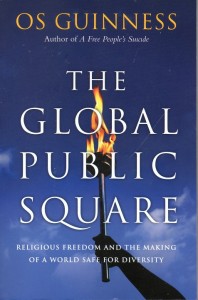Book Review: The Global Public Square by Os Guinness
Disclaimer: I received this book from a Goodreads giveaway on the premise that I would review it.
The book’s subtitle is “Religious freedom and the making of a world safe for diversity.” The idea is that for maximum “soul freedom” we need neither a “sacred” public square, where only the official/majority religion can speak to public policy (as in countries with a state religion), nor a “naked” public square, where no religion is permitted to speak to public policy (officially atheistic states such as North Korea.) Instead, Mr. Guinness advocates a “civil”public square “in which citizens of all faiths and none are free to enter and engage public life on the basis of their faith, as a matter of freedom of thought, conscience and free exercise, but within an agreed framework of what is understood and respected to be just and free for people of all other faiths too, and thus for the common good.” (p. 180-181)
As that quote might suggest, this book is rather wordy, and Mr. Guinness spends quite a long time talking around the point before coming down to his actual proposals. He does make some good points. Freedom of speech and religion can’t just be made real by laws; they also have to become “habits of the heart.” Many countries sadly have laws that guarantee freedoms that have no actual effect on the ground. And there have been excesses both by those who would insist on imposing their religious beliefs as law, and those who would ban all religious expression from public areas.
On the other hand, there are times when Mr. Guinness’ viewpoint becomes a little off, as for example claiming that human rights without a faith basis aren’t “real.” He also elides the purpose for which “under God” was added to the Pledge of Allegiance, and fails to note that the ACLU does, in fact, work to protect religious expression when it is being unconstitutionally oppressed. A particularly sticky subject touched upon but not thought about deeply here is whether someone who is in control of a secular institution can impose their religious beliefs on their employees or customers. (Mr. Guinness seems to believe the answer is “yes.”)
Also, he does that thing where polyamory is in a sentence that makes it seem morally equivalent to bestiality and female genital mutilation.
There are certainly thought-provoking ideas in this book, and if you are concerned about the role of religion and free speech in public policy, it’s one source to consider. But have a grain of salt with you at all times.



1 comment
Comments are closed.